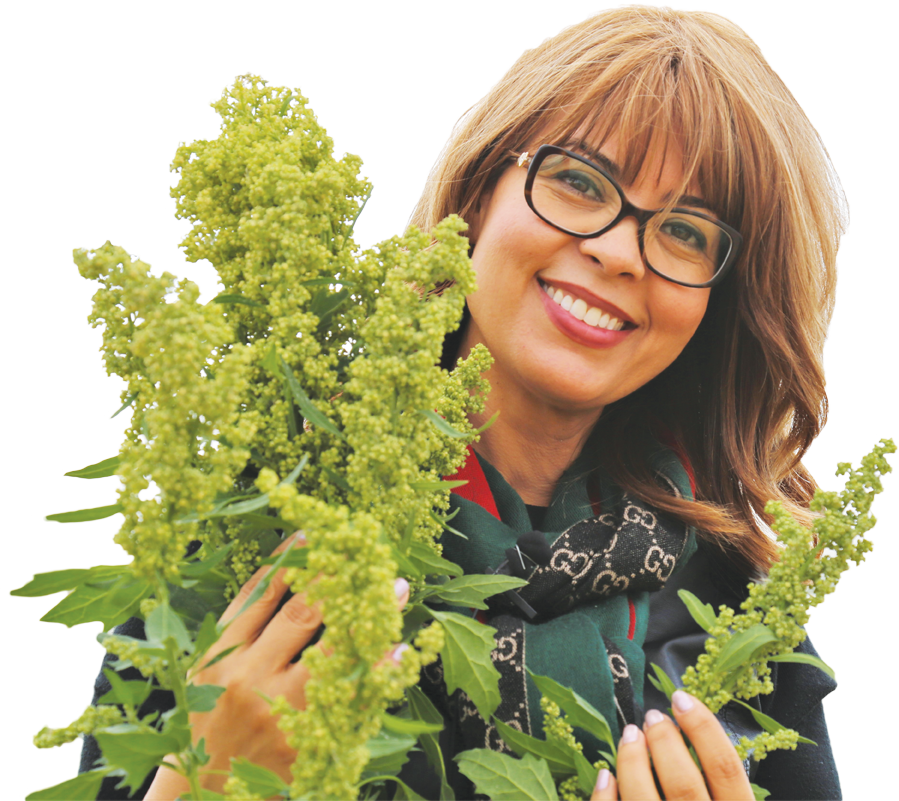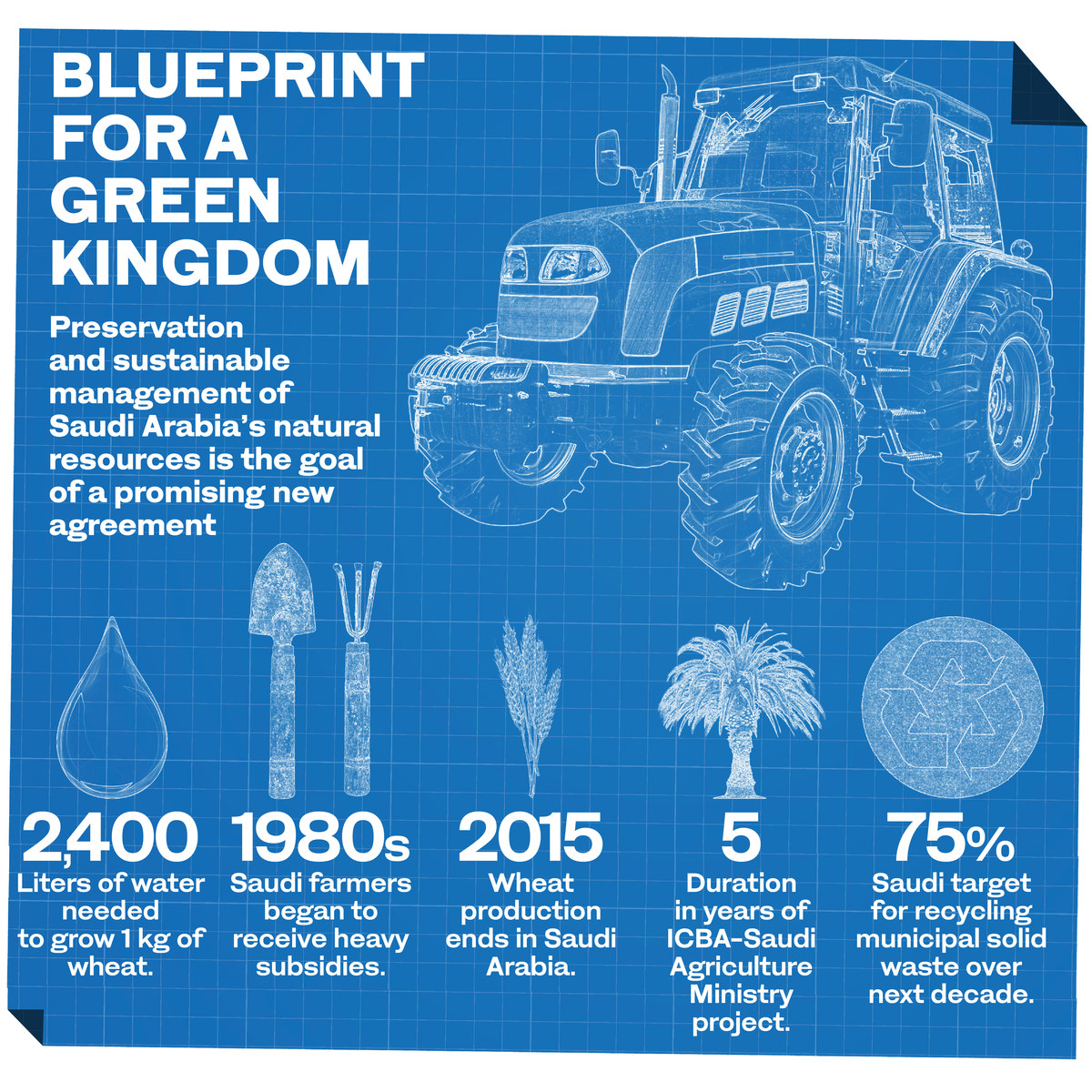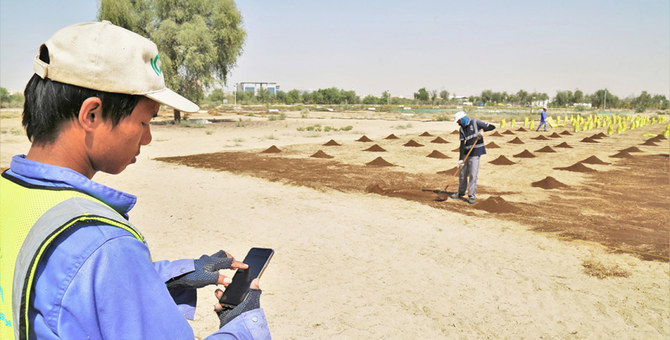DUBAI: Agricultural development and environmental sustainability in Saudi Arabia will receive a boost in the coming years, thanks to a new agreement between the International Center for Biosaline Agriculture (ICBA) in Dubai and the Saudi Ministry of Environment, Water and Agriculture.
The agreement aims to enable Saudi Arabia to achieve its goal of preservation and sustainable management of its natural resources by raising the quality of biosaline agriculture research and systems.
The ministry says that the agreement will make use of the ICBA’s expertise in capacity development besides agricultural and environmental research, especially in the fields of vegetation development, combating desertification and climate change adaptation.
“It also includes training programs for Saudi technicians and farmers,” the ministry said. “In addition, it will localize, implement and develop biosaline agriculture research and production systems for both crops and forestation, which contributes to environmental and agricultural integration.”
Dr. Ismahane Elouafi, the ICBA’s director general, told Arab News: “The agreement had been in the making for about two years. That was when we were approached by the Saudi government.”

Dr. Ismahane Elouafi, ICBA Director General, at the center's quinoa fields in Dubai. (Supplied photo)
She said: “We put forward a proposal to demonstrate how the ICBA can help the Saudi government to implement its Green Kingdom Initiative, through which the ministry is trying to restore green coverage in the country and revive old conservation practices.”
Geographical features and climatic conditions very greatly from one part of the country to the other.
In the past, experimentation with such crops as potatoes, wheat and alfalfa proved detrimental to the Kingdom’s environment and natural resources due to faster rates of groundwater withdrawal.
“The ministry wanted to put a halt to over-abstraction of water, so they went through different policies,” Elouafi said.
“They made sure, for example, that farmers stopped producing wheat because about 2,400 liters of water is consumed to produce 1 kg of wheat. It was a huge amount,” she added.
“The new strategy is to find more appropriate crops for the farming community, which is quite large in the Kingdom.”
Saudi Arabia has been trying to grow its own food on a large scale since the 1980s.
The objective of the Green Kingdom Initiative is to reduce the agricultural sector’s water demand by finding alternatives to thirsty crops.
The agreement will require the ICBA, over the next five years, to build for Saudi Arabia a new biosaline agriculture sector.

As part of this shift, cultivation of a number of crops, notably quinoa, pearl millet and sorghum, will be piloted in high-salinity regions and then scaled up.
“The crops did very well in the UAE,” Elouafi said. “We’re looking at Sabkha regions, which have very high salinity and wetlands, and are on the ministry’s environmental agenda.”
Another objective is “smart” agriculture, which will involve raising water productivity, controlling irrigation water consumption and changing farming behavior.
Elouafi said that getting farmers in the Kingdom to stop cultivating wheat took some time as they had become accustomed to heavy government subsidies. In 2015, wheat production was phased out, followed by potatoes a year later and then alfalfa.
“Farmers were provided everything to the point where they got used to a very good income and a very easy system,” she said.
“Now farmers are being asked to start producing something else, but the income won’t be the same, so it’s very important at this stage that the ministry has a plan and it’s fully understood.”
The agreement envisages preparation of proposals for ministry projects that involve plant production, drought monitoring, development of promising local crop and forestation varieties, and conservation of plant genetic resources.
“We’re also discussing capacity building because the ministry is big and has many entities. Because Saudi Arabia is a large country and has the capacity to meet some of its food requirements internally, what’s required is a better understanding of the country’s natural capabilities in terms of production of the crops it needs, like certain cereals,” Elouafi said.
“The way the authorities are going about it right now is more organized and more holistic. They’re trying to plan it properly.”
Elouafi said that having a better understanding of Saudi Arabia’s water constraints and managing the precious resource is essential.
Although almost the entire country is arid, there is rainfall in the north and along the mountain range to the west, especially in the far southwest, which receives monsoon rains in summer.
Sporadic rain may also occur elsewhere. Sometimes it is very heavy, causing serious flooding, including in Riyadh.
“They (the government) are very interested in drought management systems. The Kingdom has a long history of agriculture,” Elouafi said.
“It has large quantities of water in terms of rainfall, and certain regions have mountainous conditions, which are conducive to agriculture.”
Clearly, preservation of water resources is a priority for the Saudi government. But no less urgent is the task of conversion of green waste to improve soil quality, increase soil productivity and water retention, and reduce demand for irrigation.
The Kingdom is one of at least three Gulf Cooperation Council countries that are taking steps to develop a regulatory framework for the recycling of waste into compost.
Saudi Arabia, the UAE and Oman are respectively aiming to recycle 85 percent, 75 percent and 60 percent of their municipal solid waste over the next decade, according to a report by the Economist Intelligence Unit (EIU) entitled “Global Food Trends to 2030.”
Saudi Arabia and the UAE rank in the bottom quartile of the 34 countries covered by the EIU’s Food Sustainability Index, with low scores for nutrition and food loss and waste.
The answer, according to many farmers, policymakers and food-industry experts, is a shift toward more sustainable management of each country’s natural resources.
















